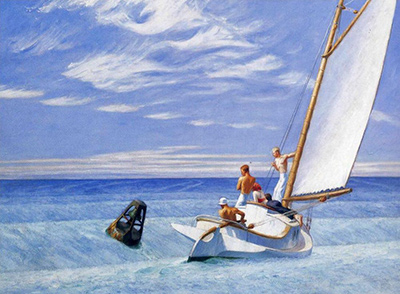Edward Hopper's 1939 piece Ground Swell was inspired by the artist's long held admiration and fascination with the sea and all things nautical.
Growing up in Nyack, New York as a child, Hopper would have been exposed to the busy Hudson River and its port and shipyard at a very early age and it is therefore unsurprising that in 1934, Edward Hopper and his wife built a home and art studio in South Truro, Massachusetts which acted as the birthplace for many of the artist's naval inspired oil and watercolur works.
The title of the piece comes from a natural phenomenon whereby buoys in the sea are triggered by far-off storms and therefore ring warning when there is actually no real danger.
This concept of threat in a serene, natural setting harks back to one of Hopper's inspirations, French artist Nicolas Poussin, whose paintings also influenced the appearance of the four figures in Ground Swell.
At first glance, Ground Swell is a very serene, relaxing piece that is easy on the eye and holds traditional aesthetic value. It uses a bright colour scheme that almost tricks its audience into a false sense of security because upon closer inspection, the work reveals a deeper level of meaning and emotion.
Although the painting features a group of humans at its core, none of them are interacting with each other, creating a sense of isolation and loneliness in spite of the group's physical proximity.
The piece's viewpoint and perspective give a sense of voyeurism and of what may be referred today in modern terms as 'people watching'.
The human figures' focus upon the nearby buoy gives Ground Swell an almost hypnotic edge that is reinforced by the dramatic, kinetic waves that dominate the piece.




